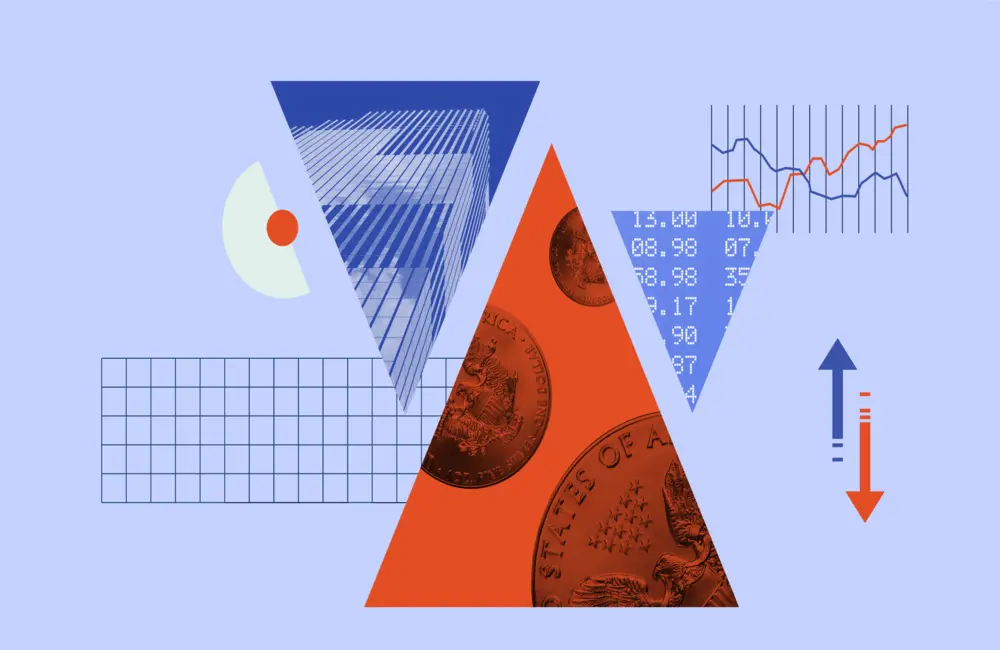ASX futures were flat at 6506 at 8.00am on Wednesday, signalling a flat open.
The S&P 500 dropped for a third straight session, falling 0.9 percent, to 3,818.80. The Dow Jones Industrial Average fell 0.6%, to 30981.33. The tech-heavy Nasdaq Composite dropped 0.9%, to 11264.73. Losses deepened in the last hour of trading.
Concerns around an economic slowdown have fueled a swift turnaround in oil prices, which had surged higher for much of the year. Brent crude futures, the global oil benchmark, dropped 7.1% to settle at $99.49 a barrel, breaking a three-session streak of gains and marking its lowest settlement price since April.
Many investors are now eyeing new inflation data, due Wednesday. Major indexes, oil prices and bond yields have declined as the release approaches. Some investors seemed hesitant to make large bets ahead of the inflation data, leaving major indexes to swing between modest gains and losses throughout the session before they turned lower in the latter half of the trading day.
“We don’t see anybody taking any huge gambles right now into equities,” said R. J. Grant, director of equity trading at KBW. “No one wants to be heroic right now.”
At home, the S&P/ASX 200 finished less than 0.1% higher at 6606.3, closing near its session low as materials and tech stocks weighed.
Green was hard to hold: The benchmark index faded slowly from a gain of as much as 0.7% in the opening stages. All of the index components that contributed negatively to its performance over the period were miners or tech companies, including four companies involved with lithium operations. The materials group ended 1.2% lower.
Tech fell 0.55 percent, with only sector heavyweights Computershare and WiseTech rising. Banks ANZ, Westpac, Commonwealth and NAB edged up between 0.5% and 1.3%, while buy-now-pay-later provider Zip Co was the top performing financial stock, soaring 6.0% after it called off its merger with Sezzle.
Iron ore rounded off another six percent drop on Friday, as China shut down its manufacturing across its major cities, plunging down 7.2% to $US105 in commodity markets 80, and a 0.4% drop in gold to US$1724.80.
Among local bonds, the yields on the Australian 2 Year government bond fell to 2.47% and the 10 Year fell to 3.41%. Abroad, the yield on 2 Year US Treasury notes ticked down to 3.05% and the yield on the 10 Year US Treasury notes was also down, at 2.97%.
At 6.30am AEST, the Australian dollar is 0.30% higher at 67.55 US cents. The Wall Street Journal Dollar Index, which measures the US dollar against 16 other currencies, dropped to 99.78.
Asia
Chinese shares dropped in the session, extending a broad decline so far this month, with the market availing itself of substantial gains it made in June. Analysts have raised alarms over growing Covid-19 risks after several cities have been reporting a spike in infections in the last few days. The benchmark Shanghai Composite Index declined 1.0 percent to close at 3281.47, while the Shenzhen Composite Index lost 1.5 percent to 2155.56. The ChiNext Price Index, which has more technology stocks, lost the most, closing down 2.3% to 2702.69. Auto stocks crashed as the sector remained under pressure from momentum that was evaporating from when the authorities aided car consumption. BYD lost 4.7% and Changan Auto fell 4.5%.
Hong Kong stocks fell 1.3% to 20844.74, with shares struggling to recover from early losses as fears mount over a surge in Covid-19 cases in China and the lockdowns that follow. Sentiment was also affected by overnight losses in US stocks on recession fears. The worst performer was BYD Co., which closed down 12 percent following unconfirmed reports that one of its biggest backers, Warren Buffett, intends to sell shares in the Chinese electric-car maker. Tech stocks fell amid regulatory jitters following China finding tech giants including Alibaba and Tencent. The Hang Seng Tech Index fell 2.1% to 4524.11. Alibaba Group slid 5.4% and Tencent closed down 1.3%.
Japanese shares closed lower, weighed down by declines in machinery and electronics stocks, as worries persist over rising costs of operations and the economic outlook. Pneumatic-control device producer SMC slid 6.2% and TDK Corp. fell 5.1%. The Nikkei Stock Average dropped 1.8% to 26336.66. After the ruling coalition's recent election win and the assassination of former Prime Minister Shinzo Abe, investors are now concentrating on any development in terms of policies. USD/JPY is at 137.38, compared with 137.43 as of Monday, 5 p.m. Eastern time. The 10-year Japanese government bond yield declines half a basis point to 0.235%.
Europe
European shares closed higher, recouping earlier losses amid worries of slowing global economic growth. The Pan-European Stoxx Europe 600 was up 0.5 percent, the German DAX climbed 0.6 percent and the French CAC 40 increased 0.8 percent. French utility EDF rose 5.8% following reports the government is prepared to offer more than EUR8B to nationalize the energy company.
“It’s been another tough day for markets in Europe with fears of a global economic slowdown once again dominating sentiment, and this seems to be driving a move into bonds, pushing yields lower,” says CMC Markets analyst Michael Hewson.
Despite this cautionary outlook, European stocks appear on track to end the day firmly in the green after a tepid start, he adds.
London FTSE 100 ended 0.18% higher on Tuesday after a weak start. “European markets have had a difficult day, with worries about a global economic slowdown seemingly driving a flight into bonds and pushing yields lower, and impacting resources and energy by applying downward pressure to oil prices,” Michael Hewson, chief market analyst at CMC Markets U.K. writes in a note.
“Concerns such as these are once again being manifested with strength in the usual safe havens, utilities and health care, Centrica [PLC] and SSE [PLC] extending gains from yesterday, with airlines, led by [International Consolidated Airlines Group S.A.], also continuing their recovery,” Mr. Hewson says.
North America
Concerns of a developing recession pressured stocks, oil and bond yields, keeping up a volatile streak for world markets.
The S&P 500 dropped for a third straight day, 0.9 percent, to 3,818.80. The Dow Jones Industrial Average fell 0.6%, to 30981.33. The technology-heavy Nasdaq Composite fell 0.9%, to 11264.73. Losses deepened in the last hour of the trading session.
Concerns of an economic slowdown have fuelled a quick turnaround in oil prices, which climbed for most of the year. International benchmark Brent crude futures fell 7.1% to $99.49 a barrel, snapping a three-session winning streak and the lowest settlement price since April.
The drop in oil prices also weighed on shares of energy companies, the biggest losers in the S&P 500 on Tuesday and a group that has been wildly volatile after being a star performer for much of this year. The energy sector lost 2%. Hess shares were down 3.9% and Marathon Oil lost 3.1%.
Most investors are waiting for new inflation data, which is scheduled to be released Wednesday. Indexes, oil prices and bond yields have all dropped leading up to it. Some investors seemed hesitant to place large bets before the inflation data came out, scratching out small gains and losses for most of the session before key indexes sank late in the trading day.
“We don’t really see anybody making any big bets right now in equities,” said R.J. Grant, director of equity trading at KBW. “Nobody wants to be heroic right now.”
Some traders blamed the further deterioration of late-afternoon declines on a tweet from the White House Director of the National Economic Council, which said the upcoming inflation numbers would be “significantly affected by stale gas price data.” Some traders took the message as a signal that tomorrow’s data would be weaker than previously anticipated by many.
The Fed’s approach to rising inflation and the central bank’s plans have unsettled markets for months, and some analysts said they weren’t predicting Wednesday’s data to fan optimism about the direction of inflation.
“We view [the June consumer-price index] as less likely to be the first in the procession of softer inflation prints,” analysts at Citigroup said in a note to clients on Tuesday. “Markets may still be especially sensitive to another upside surprise.”
For now, the Fed is focused on raising rates in a bid to bring down high prices. While the new campaign and easing of US economic momentum are good news for consumers, investors are saying both could lead to more pain for markets after a brutal first half of the year. China’s difficulty in containing Covid-19 and the war in Ukraine are also adding to the challenges for money managers.
Talk of a recession has ruled Wall Street recently. Confidence among small-business owners fell to its lowest level in nearly a decade in June, according to data from the National Federation of Independent Business.
“The investors we talk to are typically well-hedged, anticipating worsening economic conditions,” said Anand Omprakash, head of derivatives and quantitative strategy at Elevation Securities.
Some investors seemed to become more cautious going into the inflation report in other corners of the market. Call options volumes on Monday shrank to their lowest level in more than three years, excluding holidays, said Danny Kirsch, head of options at Piper Sandler & Co. Call options provide investors with the right, but not the obligation, to buy stocks at a particular price at a given date.
Earnings season among large US companies will gain momentum later in the week, with reports scheduled from major financial institutions. Investors will focus closely on the commentary of bank executives about the course the economy is taking, and the impact that higher input costs are having on profit margins.
Some investors have said they are looking for larger divergences among stocks and sectors across the broader market as upcoming financial results determine the market’s winners and losers.
“The buy the dip days, I think, are mostly well behind us,” said Neil Desai, a portfolio manager at Putnam Investments. “We’re definitely more guarded.”
In other commodities, copper prices dropped 4.1% to the lowest since November 2020, extending a recent decline. The industrial metal, a bellwether for the global economy due to its use in construction and heavy industry, is now more than 30 percent below its peak level reached in March.






















